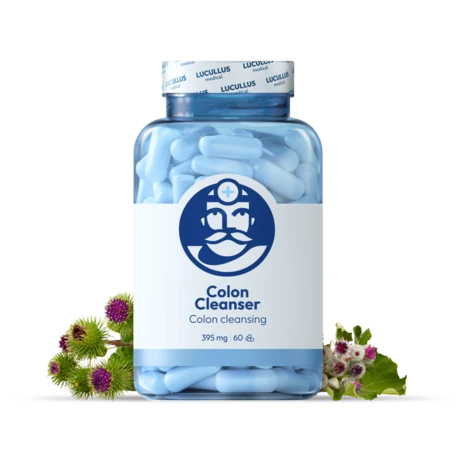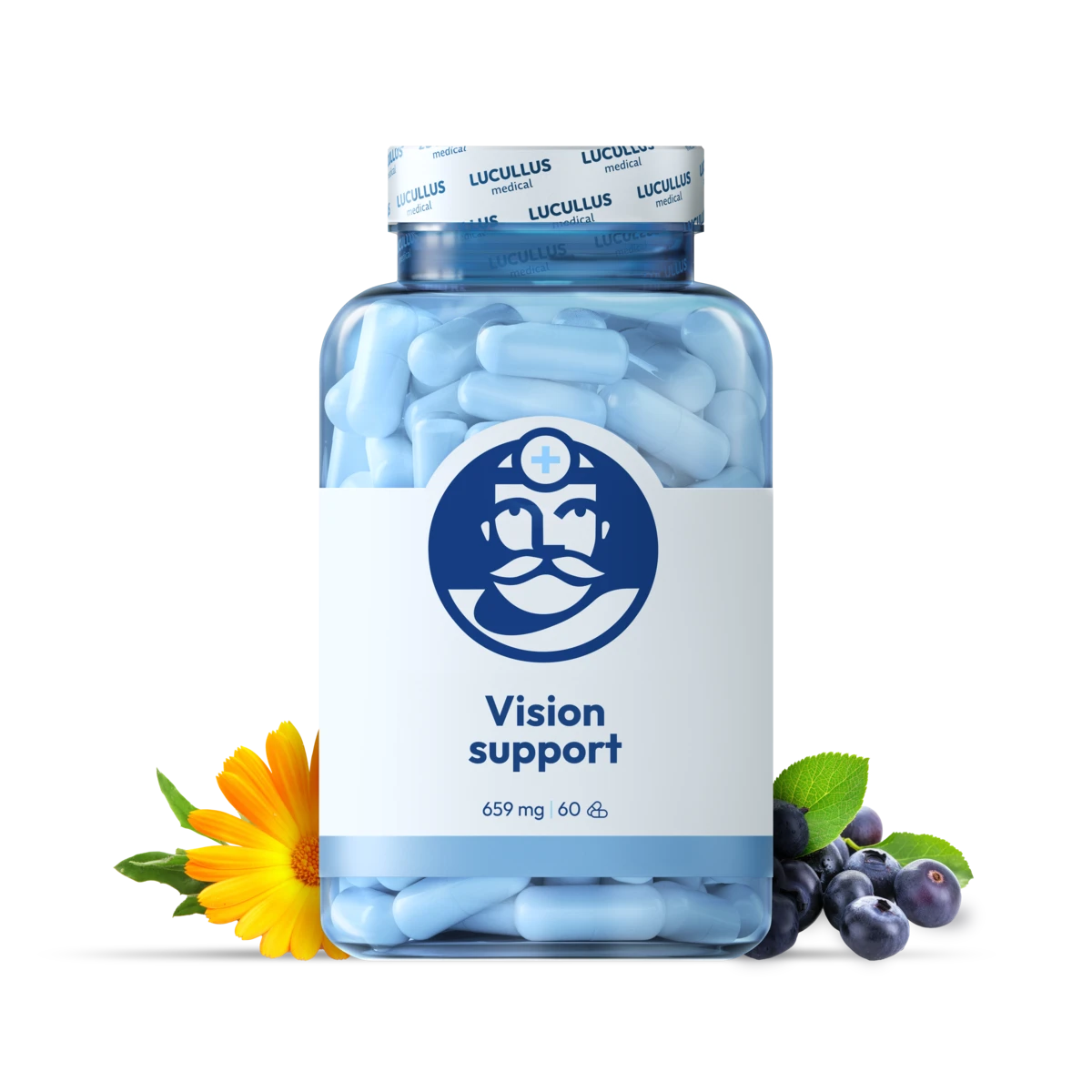
Účinky
Supports regular bowel movementsAids in natural detoxificationReduces inflammation in the digestive tractRelieves bloating and gasEnhances nutrient absorption
Pack of 60 capsules
Pack of 130 capsules
| Active ingredient | In daily dose | % Ref |
|---|---|---|
| Blueberry fruit extract 4:1 (Vaccinium myrtillus) | 250 mg | - |
| Calendula officinalis flower extract standardised to 5% lutein | 200 mg | - |
| - of which lutein | 10 mg | - |
| Vitamin C (ascorbic acid) | 80 mg | 100.00% |
| Grape (Vitis vinifera) seed extract standardised to 95 % proanthocyanidins | 50 mg | - |
| Calendula officinalis flower extract standardised to 5% zeaxanthin | 40 mg | - |
| - of which zeaxanthin | 2 mg | - |
| Fennel seed extract 4:1 (Foeniculum vulgare) | 25 mg | - |
| Vitamin B2 (riboflavin) | 1.4 mg | 100.00% |
| Vitamin A (betacarotene) | 400 mcg | 50.00% |
Ingredients: Bilberry extract, calendula extract, ascorbic acid, grape vine extract, fennel extract, beta-carotene, riboflavin, vegan capsule made of hydroxypropyl methylcellulose and water.

Focus your eyes naturally and effectively with the Vision Support nutritional supplement
Your eyes work hard every day – long hours in front of screens, night-time driving, artificial lighting and intense sunlight constantly strain them. Give them the care they deserve. Vision Support is a natural, carefully formulated combination of vitamins and plant extracts that contributes to clear, sharp and healthy vision.
Vision is constantly exposed to oxidative stress and high demands. Lutein and zeaxanthin act as natural "sunglasses" – they filter harmful blue light and protect the macula from degeneration. Anthocyanins from blueberries strengthen blood vessels and improve blood flow to the retina, which helps regenerate eye cells. Antioxidants from grape seeds and vitamin C protect tissues from ageing and maintain the strength of collagen structures. Beta-carotene and riboflavin complement the effect by promoting adaptation to darkness and reducing the risk of inflammatory processes. This complex combination creates a natural protective shield for your eyes and helps prevent fatigue, dryness, irritation and age-related decline in visual acuity.
Take 1 capsule daily, ideally with food. The product is manufactured in Slovakia, free of GMOs, allergens, gluten and artificial colours. Each batch undergoes rigorous laboratory testing for purity and efficacy.
Start seeing the world more clearly every day. Strengthen your eyesight with the natural power of plant extracts and vitamins – for healthy, fresh and rested eyes.
I have more energy and my eyes are less irritated. I recommend to anyone who wants to see better.
The eye support really helped me. My eyes are less tired. Daily use is worth it.
I adore these capsules! I feel like I can see sharper and brighter.

In each of our recipes, we invest in research to identify the right ingredients, compounds, and doses to achieve real benefits. We then manufacture our unique recipes in the most modern facilities in Slovakia.
Mainly flavonoids, improve blood flow in the blood vessels of the eyes, act antioxidant.
Containing lutein and zeaxanthin, they contribute to the protection of the eyes from UV rays and blue light.
The powerful antioxidant vitamin C will help keep immunity in tip-top shape, help build and protect tissues, and accelerate healing.
Mainly flavonoids, improve blood flow in the blood vessels of the eyes, act antioxidant.
It reduces irritation and inflammation in the eye area, promotes digestion, relieves bloating and cramps.
Helps prevent oxidative damage to the eyes, supports energy metabolism.
Beta-carotene is a provitamin (precursor) of vitamin A, which we get directly from plant sources.

Read the latest news about quality dietary supplements, vitamins, immunity, and health.

Kto má rád svalnatého Arnolda Swarzeneggera, určite videl dokument Pumping Iron - Dvíhanie železa o jeho zložitých premene z chudého tínedžera až na absolútny telesný Olymp. Jeho muskulatúra je obdivuhodná dodnes. A pomohlo mu ku tomu obyčajné železo. Samozrejme - ide o vtip, na železo hlavne dvíhal. Avšak ku tomu, aby jeho svaly vyzerali ako tie Herkulove, potreboval železo v úplne inej forme.

V naturálnom doplnku je ukrytá menej známa rastlina diskórea huňatá ( Discorea villosa, Wild yam) z čeľade Dioscoreaceae. Poďme sa s ňou zoznámiť ☺ Existuje viac ako 600 druhov rastlín yam, najvýraznejší druh je divoký yam (Dioscorea villosa). Táto trvá nenáročná liana (vinič) rovníkových oblastí, má listy v tvare srdca. V listoch a koreňoch je prítomný diosgenín (primárna zložka), práve koreň sa používa v medicíne aj v našich doplnkoch, ako koncentrovaný extrakt (najvyššia výťažnosť), štruktúra je podobný cholesterol. Táto látka sa používala na výrobu prvých antikoncepčných podkladov.

Maybe it's burnout ... that's the current description of the state when we feel different. When the coffee we loved no longer works and in the afternoon we are overwhelmed by unbearable fatigue, when in the evening we have no strength for anything, neither for sports nor for friends. And certainly not for another day at work. A nutritionist would describe this state with further findings of our diet with the words - „ You have a lack of thiamine (B1), which is essential for the proper functioning of the nervous system and the conversion of food into energy. Your diet is full of processed carbohydrates, but almost without B1. And when the body doesn't have enough thiamine, you can feel fatigue, forgetfulness, irritability, and even anxiety. And caffeine? It depletes thiamine in the body even more!“ We certainly wouldn't think that this state could be caused by a “triviality”. After all, many of us don't register thiamine, I admit it was also my case. This first of the discovered vitamins in 1912 was named by the Polish biochemist Funk with the term vita (necessary for life), amine (substances that contain nitrogen). Since then, it has gained more names, like aneurin, and for 25 years we have called it thiamine. It is essential, meaning it cannot be synthesized and must come from the diet. It sounds almost frightening that without it we wouldn't survive longer than a few days, at most weeks. This is because the body cannot store it for long and it is necessary to ensure its intake regularly, as it is irreplaceable for the proper functioning of the organism. On the contrary, its abundance helps improve concentration and memory.

“Is it just another vitamin... or?” one might think, but the more we learn about pantothenic acid, the more it fascinates us. Vitamin B5 plays a crucial role in converting food into energy, supports concentration, mental well-being, and even skin regeneration. Without it, the body would not be able to properly produce hormones or fight stress. It is also a substance that is hidden in every cell of our body, accompanies us from birth, and contributes to sufficient energy, skin health, and mental acuity. Although we may overlook it, its importance is undeniable, and its name is no coincidence. It comes from the Greek word “panto”, meaning “everywhere.” And indeed, it is omnipresent, irreplaceable, and somewhat mysterious. If we start exploring where this essential vitamin is found, it's in eggs, nuts, whole grains, shellfish, avocados, salmon, liver, kidneys, beef, yeast, vegetables... And if we've just realized that our diet is low in these foods, we should consider supplementing B5. After just a few days, we would notice a change. We would wake up with more energy, have a clearer mind, and even see an improvement in our skin. Colleagues would notice that we work faster, are more creative, and less stressed. Pantothenic acid will help us get back in shape. And for us, it will no longer be just another substance on the list of vitamins.

Ak patríte ľuďom, ktorí neradi prehĺtajú tabletky, určite ste už riešili dilemu, ktorý výživový/vitamínový produkt potrebujete. Ak by ste chceli byť dôslední, museli ste ich denne prehltnúť niekoľko. Preto kombinácie, ktoré vám s týmito poskytnúť dokážu pomôcť. Jeden z nich je aj dvojkombinácia vhodného a horčíka: CalMag .

Kotvičník zemný je malá nenápadná rastlinka so žltými kvietkami, v podstate burina, ktorá sa z Číny a Japonska rozšírila po celom svete. Dnes je dokonca pestovaná v záhradách pre svoje účinky na ľudské telo. Pozná ho ajurvéda aj stará grécka medicína. V zahraničí je známy pod názvami: kozia hlava, diabolský tŕň, burra gokharu av ajurvéde ako gokshura. Už po stáročia sa používa ako zázračný liek na neplodnosť, impotenciu, erektilnú disfunkciu. Je to proste testosterón booster!